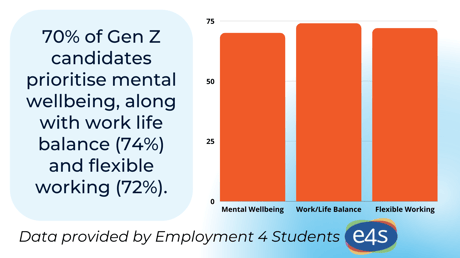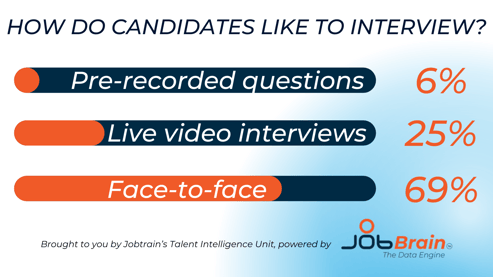What is Generation Z?
For ease of reference, births within certain time periods are grouped as generations, each with a specific label; useful for providing a constituent reference for the likes Governments, researchers, academics, statisticians.
| Generation Alpha | 2012 - mid 2020s |
| Generation Z | 1997 - 2012 |
| Generation Y - "Millenials" | 1981 - 1996 |
| Generation X | 1965 - 1980 |
With regards to Generation Z, while they share a number of characteristics with Millennials, their formative years have been shaped by a drastically different world, resulting in key differences in attitudes, tendencies and outlook.
According to McKinsey, their studies revealed core behaviours, all anchored in one element: this generation’s search for truth. Gen Zers value individual expression and avoid labels. They mobilize themselves for a variety of causes. They believe profoundly in the efficacy of dialogue to solve conflicts and improve the world.
Why should recruiters take notice of the different generations?
Fair treatment for all should be the cornerstone in all walks of life, not just recruitment. Recognising and adapting to the differing characteristics is something separate to – and should not jeopardise – fair processes and treatment, but can be beneficial to harmony and success for all concerned.
Why focus on Generation Z?
Generation Z accounts for 20% of the UK population and will be the largest section of the UK population by 2029. At the older end of the generation, 18 - 24-year-olds are in work or becoming workers. According to Deloitte; as Gen Zs are about to step onto the world stage, the impact of their entry will be swift and profound, its effects rippling through the workplace, retail consumption, technology, politics, and culture. Radically different than Millennials, this generation has an entirely unique perspective on careers and how to define success in life and in the workforce.
What can be expected of Generation Z in the workplace?
.jpg?width=225&name=eliott-reyna-8ExW1R3DiYM-unsplash%20(1).jpg)
Forbes explains for Gen Zs, their technological dependence is not necessarily considered to be an addiction, but rather that they view their mobile devices as “extensions” of themselves. Generation Z is also well known for using FaceTime instead of texting or calling. Social platforms and YouTube rather than TV and film perhaps explain why Gen Z are either being – or watching – influencers; a new but now common phenomenon.
Perhaps to some degree, this explains their findings that Gen Z prefers and perform better when working for Gen Y line managers, and (as both LinkedIn and Inc.com explain) Gen Zs prefer self-directed learning as a training method for their roles. Online microlearning platforms are a good example of how Gen Z relies on technology to give them the skills they need to succeed at their job.
Despite this symbiotic relationship with technology, Forbes goes on to explain that Gen Z advocates a more balanced work/life experience to help them escape the burnout that has inflicted older generations, with 38% counting work/life balance as a priority when choosing an employer.
Also, and perhaps sounding contradictory, Gen Z prefers steady communication with their professional teams and thrives in an environment of transparency. 90% of Gen-Z workers desire and value a human connection in their professional environments, 60% of Gen Z employees expressed the desire to have clarity on the expectations and parameters of their jobs, and 60% of Gen Z workers want direct, frequent communications and check-ins with their supervisors for performance evaluation.
Western Governors University points out that despite (or perhaps because of) the influence that toxic political differences and economic volatility have had on them, Gen Zs are much more tolerant of other races, cultures, and genders, as well as much more interconnected with them all. Many younger generations like millennials and Generation Zs have a sense of social justice, making diversity a must in the workplace.
They refer to a study discussed on PR Newswire highlighting that 63% of Gen Zers feel it’s important to work with diverse education and skill levels, with an additional 20% noting it’s important to work within teams that feature people of different cultures. Many in Gen Z pay close attention to a company’s diversity efforts when making a decision on whether or not to pursue employment with a particular business—and it makes a big difference in the long run, as studies have shown that many employees who work at diverse organizations stay there beyond five years.

On a separate note, WGU points out that Like the millennial generation before them, members of Gen Z can also be considered a “side hustle” generation—more than half of them prefer to juggle more than one source of income. According to BusinessInsider.com, it’s very common to see industrious Gen Zs working on freelance photographic projects or managing their own e-commerce website during a lunch break.
Nearly 1-in-5 Gen Zs want to run their own business, and the vast majority of them would like to turn pet hobbies into full-time careers.
How Should Recruiters Adapt for Gen Z Workers?
1. Attraction & Engagement Channels
Traditional job advertising channels need to give way to more social forms of advertising, with heavy use of video content, influencers and community/peer endorsements.
CareerBuilder advises the candidate application rate goes up by when a job post includes a video, and Jobtrain’s research of its ATS clients found that Organisations suffer 3 times more rejected applications from adverts without videos.
Pay attention to ‘chatter’ and reviews online about your company and working there. Positive actions in response to the points below may help lift an Organisation’s Glassdoor rating which will have a positive influence on the number and quality of applicants.
2. Brand, & Corporate Social Responsibility
Brands that recognise individuality, convey truth, back freedom of expression, and support meaningful causes will capture their attention. Don’t just point it out in adverts or on your website though. Embed it into your onboarding experience that encourages and supports the soon-to-be-employee to participate in any schemes, volunteering or fundraising. If your onboarding experience is online via your ATS, then even better. The time between offer and starting work is the most expensive time for someone to drop out of the process.
%20(1).jpg?width=506&name=austin-distel-tLZhFRLj6nY-unsplash%20(2)%20(1).jpg)
3. Equality, Diversity & Inclusion
A statement on the website isn’t enough; it has to be demonstrable. If you are part of schemes promote them, make them accessible.
Put tools in place. For example use Accessibility Tools on your online recruitment platform. The British Dyslexia Association estimates up to 10% of UK adults have dyslexia to some degree; a sizeable chunk of the available candidate pool will find it easier to apply if these tools are available.
Explain your practices, whether it's anonymised shortlisting, or guaranteed interviews for some.
Part-time and flexible working has been shown to attract a more diverse set of candidates – particularly increasing the number of female candidates, older candidates and candidates with a disability - to boost inclusivity.
In fact, a survey by TalView of Talent Acquisition Professionals found that 79% believe remote hiring can help improve diversity in their organisations, and Deloitte’s research found that Diverse companies enjoy 2.3 times higher cash flow per employee.
4. Work/life balance
Remote working will also make part-time and flexible working easier. Gen Z embraced remote working ahead of many companies long before they were forced to by the Covid-19 pandemic. The pandemic showed to everyone else that remote working or a hybrid approach works.
It supports Gen Z’s technological interconnectedness for work and communication, a good work/life balance, and the freedom to continue to pursue their ‘side hustle’ without the fear of burnout.
Recruiters may need to work on influencing resistant line managers (perhaps of the X generation), highlighting the benefits and necessity. Advertising should clearly promote this.
5. Communication
Frequent Communication through the recruitment process will make the GenZ candidates feel connected and engaged. SMS and emails sent from your ATS can typically be automated, and 2-way video platforms for interviews, simple catch-ups or to immerse them into the team as part of the onboarding pre-start. In fact, applicants who apply via their mobile – which is likely to be all Gen Zs – are much keener to interview via video platform than face-to-face according to Jobtrain’s research.